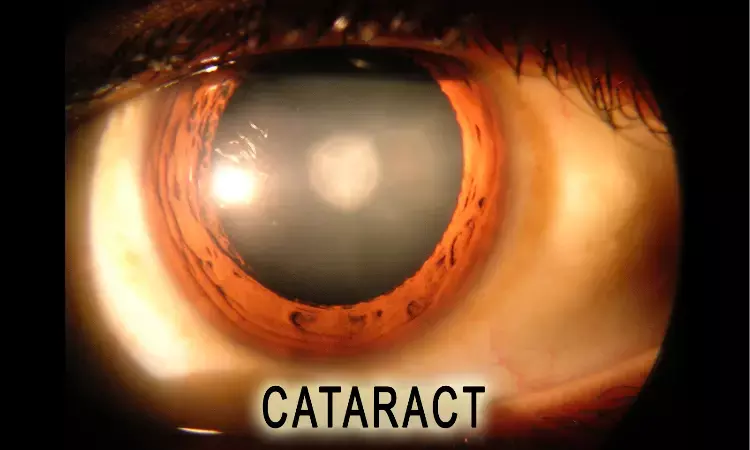- Home
- Medical news & Guidelines
- Anesthesiology
- Cardiology and CTVS
- Critical Care
- Dentistry
- Dermatology
- Diabetes and Endocrinology
- ENT
- Gastroenterology
- Medicine
- Nephrology
- Neurology
- Obstretics-Gynaecology
- Oncology
- Ophthalmology
- Orthopaedics
- Pediatrics-Neonatology
- Psychiatry
- Pulmonology
- Radiology
- Surgery
- Urology
- Laboratory Medicine
- Diet
- Nursing
- Paramedical
- Physiotherapy
- Health news
- Fact Check
- Bone Health Fact Check
- Brain Health Fact Check
- Cancer Related Fact Check
- Child Care Fact Check
- Dental and oral health fact check
- Diabetes and metabolic health fact check
- Diet and Nutrition Fact Check
- Eye and ENT Care Fact Check
- Fitness fact check
- Gut health fact check
- Heart health fact check
- Kidney health fact check
- Medical education fact check
- Men's health fact check
- Respiratory fact check
- Skin and hair care fact check
- Vaccine and Immunization fact check
- Women's health fact check
- AYUSH
- State News
- Andaman and Nicobar Islands
- Andhra Pradesh
- Arunachal Pradesh
- Assam
- Bihar
- Chandigarh
- Chattisgarh
- Dadra and Nagar Haveli
- Daman and Diu
- Delhi
- Goa
- Gujarat
- Haryana
- Himachal Pradesh
- Jammu & Kashmir
- Jharkhand
- Karnataka
- Kerala
- Ladakh
- Lakshadweep
- Madhya Pradesh
- Maharashtra
- Manipur
- Meghalaya
- Mizoram
- Nagaland
- Odisha
- Puducherry
- Punjab
- Rajasthan
- Sikkim
- Tamil Nadu
- Telangana
- Tripura
- Uttar Pradesh
- Uttrakhand
- West Bengal
- Medical Education
- Industry
Atopic dermatitis in children linked to increased cataract risk: Study

Istanbul, Turkey: Children with atopic dermatitis (AD) are at increased risk of developing cataract, finds a recent study in the journal Dermatologic Therapy. According to the study, lens densitometry increases in AD patients independent of treatment.
Atopic dermatitis is known to be associated with a wide variety of ocular complications; however, no study till now has measured lens densitometry in pediatric patients with AD. Yüksel Mavise and Karaman Sevil from Istanbul Medipol University, Istanbul, Turkey, aimed to investigate lens densitometry in children with AD.
For the purpose, the researchers included 31 pediatric patients (13 males, 18 females; mean age 12 ± 3 years) with AD and 20 healthy children (9 males, 11 females; mean age 12 ± 2 years), who presented to the dermatology clinic of Istanbul Medipol Mega University between December 2018 and May 2019. AD diagnosis was based on the UK Working Party's Diagnostic Criteria for AD. The researchers excluded patients receiving inhaler and systemic steroids. All children were examined by the same dermatologist and ophthalmologist.
Key findings of the study include:
- The mean values of best‐corrected visual acuity, refractive error, and axial length were similar between both groups.
- The lens densitometry values of zone 1, zone 2, and zone 3, as well as the average lens densitometry measurements were found statistically significantly higher in children with AD compared to the controls.
"This is the first study to demonstrate an increase in treatment‐independent lens densitometry in children with AD," wrote the authors.
"Routine ophthalmologic examinations are not performed in patients with AD since only a limited number of dermatologists are aware of the risk of developing cataracts independent of treatment in patients with this condition," the researchers report. They advocate for early ophthalmologic examinations in all pediatric patients diagnosed with AD with a particular emphasis on lens densitometry values.
The study titled, "Evaluation of lens clarity in children with atopic dermatitis: A densitometric analysis with Pentacam," is published in the journal Dermatologic Therapy.
DOI: https://onlinelibrary.wiley.com/doi/10.1111/dth.14634
Dr Kamal Kant Kohli-MBBS, DTCD- a chest specialist with more than 30 years of practice and a flair for writing clinical articles, Dr Kamal Kant Kohli joined Medical Dialogues as a Chief Editor of Medical News. Besides writing articles, as an editor, he proofreads and verifies all the medical content published on Medical Dialogues including those coming from journals, studies,medical conferences,guidelines etc. Email: drkohli@medicaldialogues.in. Contact no. 011-43720751


